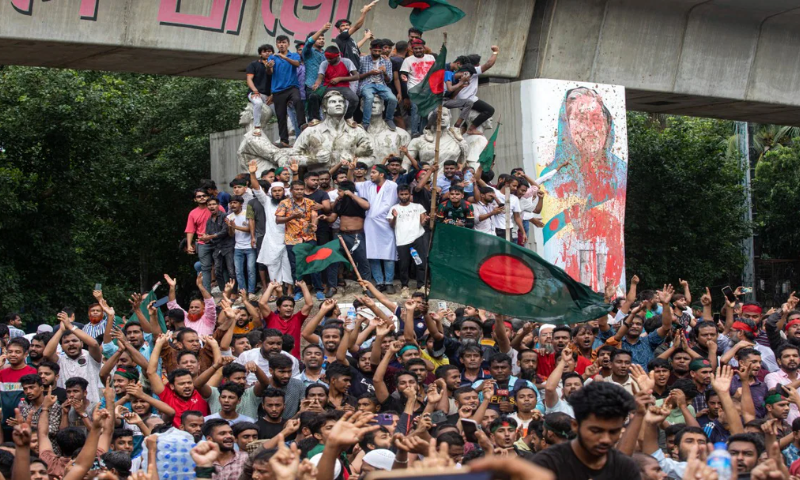DHAKA: Bangladesh President Shahabuddin has dissolved the national parliament following an ultimatum from protesting students.
The Bangladesh Awami League Chief and Prime Minister Sheikh Hasina Wajid fled to India on Monday, just before anti-quota system protesters stormed the Prime Minister’s residence.
The anti-discrimination student movement in Bangladesh had previously issued an ultimatum to the president to dissolve the national parliament. The students declared they would not accept an army-led government in the country and demanded that the president dissolve the current National Parliament by 3 PM.
“The anti-discrimination student movement gave an ultimatum to Shahabuddin. If not, they will take ‘severe action’,” Bangladeshi media reported. Asif Mahmood, the coordinator of the anti-discrimination student movement, issued the ultimatum in a video message on Facebook.
Before this, the President announced in his address to the nation at around 11:30 PM on Monday that the current Parliament would be dissolved as soon as possible and an interim government would be formed promptly.
What Happened in Bangladesh?
These developments occurred as Bangladesh’s Army Chief General Waker-uz-Zaman stated on Monday that he would form an interim government after Prime Minister Sheikh Hasina stepped down and fled Dhaka amid mass protests demanding her resignation.
In his address broadcast on state television, the Army Chief confirmed that Prime Minister Sheikh Hasina had resigned following weeks of political unrest in the country. He committed to forming an interim government and addressing the nation’s pressing issues.
The army chief vowed to tackle the violence and address the economic and social turmoil affecting Bangladesh. He promised to address “all the injustices.”
“I give you my word that all the injustices will be addressed,” the career infantry officer said, although it was not immediately clear if he would head the new government.
The recent unrest began as student protests against government hiring policies but escalated into broader demands for Hasina’s resignation. The violence claimed at least 300 lives and prompted the army’s intervention on the streets.
An aide stated that the deposed Prime Minister Sheikh Hasina fled the capital, Dhaka, by helicopter. Indian media reported that Sheikh Hasina flew to a military airbase near New Delhi. Thousands of people, especially students, took to the streets to celebrate, with many storming the prime minister’s official residence. Protest demonstrations that started last month over government job quotas expanded into nationwide political unrest. Students have been marching on the roads of Dhaka to demand justice for around 300 people killed since last month.
Khaleda Zia Released
Bangladesh’s President Mohammed Shahabuddin on Monday evening ordered the release of jailed former Prime Minister and key opposition leader Khaleda Zia, hours after the military took control of the government following the ousting of her political rival, Sheikh Hasina.
In a statement released by the president’s press team, it was announced that a high-level meeting chaired by President Shahabuddin had unanimously decided to free Khaleda Zia, the chairperson of the Bangladesh Nationalist Party (BNP).
West Urges Calm After Sheikh Hasina’s Ouster
Western countries called for calm in Bangladesh after Sheikh Hasina fled, with Washington welcoming the military’s formation of an interim government rather than further crackdowns on protest demonstrators.
UN Secretary-General Antonio Guterres called for a “peaceful, democratic, and orderly transition” as well as a “full, impartial, independent, and transparent inquiry into all acts of violence,” his spokesperson Farhan Haq stated.
London called for the UN to take the lead in a probe. In a statement, Foreign Secretary David Lammy said that the people of Bangladesh deserve an independent UN-led investigation into the events of the last few weeks.


